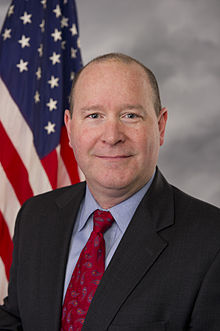On Tuesday, Eighth District Congressman Larry Bucshon, M.D. participated in a discussion at the White House on solving our nation’s opioid crisis. The discussion was led by New Jersey Governor Chris Christie, who has been selected by President Trump to chair the recently announced President’s Commission on Combating Drug Addiction and the Opioid Crisis.
“We are facing an epidemic that reaches every corner of this country.  If left unchecked, it will continue to devastate communities and families across the nation. President Trump has recognized the importance of solving the opioid crisis by creating this commission. I’m honored to have been able to share with Governor Christie my experience as a physician and the experiences of my constituents who are on the front lines of this fight,â€Â said Bucshon. “At today’s meeting, I conveyed to Governor Christie the critical importance of building on our work to pass comprehensive addiction treatment legislation, exploring the development and approval of non-opioid alternatives for pain management, and implementing reforms that strike the right balance between proper pain management and addiction prevention. I look forward to continuing to work with Governor Christie and the commission as they develop positive solutions to the crisis.â€
Opioid abuse disorder and drug addiction have impacted every community in the nation, reaching across socioeconomic and geographic lines. According to the Center for Disease Control and Prevention (CDC), 91 American lives are lost every day from an opioid overdose.
Southern Indiana is bearing the brunt of the epidemic.
Last week, Vigo County suffered four suspected overdose deaths and authorities have responded to 16 opioid or heroin induced overdoes already this year. Vanderburgh County saw 29 deaths from overdose in 2016, which is a fourfold increase from the prior year and a rate the County Corner expects to rise in 2017.
Tuesday’s meeting comes on the heels of an announcement that the Department of Health and Human Services (HHS) will provide $485 million in grants to states to combat the growing opioid crisis. In particular, the state of Indiana is set to receive $10.9 million in funding provided for in the 21st Century Cures Act, which was signed into law in 2016 with the help of Bucshon.
During his time in Congress, Bucshon has made drug addiction a legislative priority.
Last year, Bucshon was deeply involved in crafting and passing the Comprehensive Addition Recovery Act (CARA), the most significant drug addiction legislation to be signed into law in recent history. Bucshon authored an integral portion of the law which expanded access to medication-assisted opioid addiction treatment, ensured patients have access to a wider range of comprehensive, evidence-based treatment options, and minimized the potential for drug diversion. His work on the legislation was recognized by the Coalition to Stop Opioid Overdose.
In an effort to see that progress through, Bucshon led a bipartisan letter to HHS Secretary Tom Price, M.D. earlier this month urging full implementation of CARA, specifically the addition treatment portions of the law.
When the White House announced the commission in late March, Bucshon praised the movetweeting, “Encouraged @POTUS is launching a new commission to help put an end to the opioid epidemic, which as greatly impacted the Hoosier state.â€Â He went on to say, “I look forward to working with @POTUS and the new commission to build on the progress we’ve made to help our communities and patients.â€






There is no simple answer to the opiod problem. In 1953 the AMA recognized addiction as a disease however it has been treated as a crimminal problem. Physicians, while licensed to prescribe opiod, receive little to no training in addiction. As a result physicians created many of the opiod addictions. Only when the DEA started monitoring prescribed opiods did most physicians start to monitor the prescriptions being written. The physicians stopped renewals and thus created a ready made market for the street dealer. Mothers have been known to fight physicians when it was deemed their children no longer required adderal because the Mothers were crushing and snorting the drug. I have had patients tell me their famlies have told them, “why don’t you quite using street drugs and go to the doctor like we do?” Then we have the social economic issue that creates misery and to escape the misery, those affected turn to drugs as an escape. That is where we, the government, has been unwilling to address minimum wage to start to bring those affected up and out of poverty. Included in this are those vets suffering PTSD. Good enough to fight but not good enough to treat.
Now let’s focus on the real issue that fuels this disaster “MONEY and POLITICS.” Money in private prisons, careers in fighting drugs, public defenders campaigning on “getting tough on drugs”. Money in treatment. Private companies have sprung up like mushrooms in the spring. They are called harm reduction centers. Addicts can buy from them instead of off the street. I call them “Hotel Californias” because the addict checks in but rarely checks out. They are charge $15 and up per day for their drugs depending on location. The addict is the income unit for the treatment center. Rehab the addict and you lose income. Therefore there is no incentive to move past supplying the drugs. Some clinics have a patient load per counselor of upwards of 70 + pts. and the state of Indiana requires one hour of counseling per pt. Do the math, it isn’t happening.
Solution?
Stop treating drug addiction as a crimminal activity and you remove the element of profit for those supplying drugs. And no the suppliers aren’t street dealers. The suppliers that the police rarely catch are sitting in Denny’s having coffee. The street dealers are simply addicts that obtained enough money to buy a little extra to deal to friends offsetting their habits cost.
Stop the “Hotel California” private centers. These need to be long term nonprofit centers. Drug addiction is a rest of your life treatment program the requires weekly counseling to daily medicating.
If we are going to send people to war and cover that expense then we are going to cover the expense of treatment when they return period.
Long term career training and a liviable minmum wage is require. We are dealing with folks that stopped growing mentally when they started using. If they started using at age 15 and they are now 30; then you have a 30 year old with a 15 year old mentally. This too requires long term rehabilitative treatment.
Where will the mony come from? By no longer incarcerating those suffering from addiction. We currently spend $35000+ per year to house an inmate. Direct this money into nonprofits that are tiered to stop the addict , move to a counseling and rehabiltative phase, followed by out pt. treatment. Then we will be able to make a huge dent in the epidemic. Otherwise we will keep on doing the same old thing of creating political committees staffed with people that haven’t a clue as to what is actually happening, arresting and throwing addicts into for profit prisons where they can learn how to not get caught the next time, electing prosecutors because they are going to get tough on drugs. and political hacks with the bumper sticker slogan “Just Say No”.
Saul always has answers that involve spending other folks’ money and he never blames the users that decide to desecrate themselves. Saul believes in a Communist Utopian society that cannot ever exist because human beings aren’t all alike. Some are self-reliant and don’t want to live on Orwell’s farm like Saul does. Saul panders to the weak minded and perpetual victims that drain the vitality of our society. Saul’s answer is to become like them and let the government coddle you. He wants to be the government.
Comments are closed.